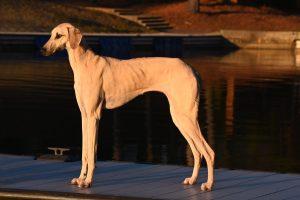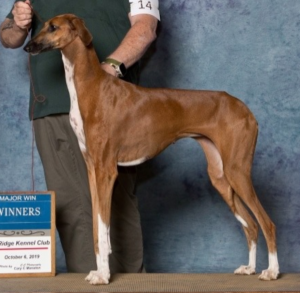Living History on the Silk Road
Landrace or Breed in Asiatic Sighthounds
Dedicated dog enthusiast and researcher Neil Trilokekar joins host Laura Reeves on the fascinating topic of Asiatic Sighthounds and their development from the landrace dogs of the Silk Trail over the Millenia.
Listeners may remember Trilokekar as part of our panel discussion of “new” exhibitors. This extended conversation touches on his personal
[caption id="attachment_8304" align="alignleft" width="300"] Caravan Hound from India. Photo credit: Neil Trilokekar[/caption]
journey searching for authentic Caravan Hounds in his homeland.
The recent news of researchers nailing down the DNA of some sled dogs as a landrace, prompted the opportunity to dig into the endlessly intricate history of the elegant dogs of Central Asia. Additional DNA studies gather more information on the evolutionary development of landraces and the breeds that follow.
Landraces in dogs are defined as "dog or any livestock animal has been bred without a formal registry, although their breeders may have kept written or informal pedigrees of their animals." These are distinguished from dog breeds which have breed standards, breed clubs and registries. Trilokekar expands on this concept in relation to the breeds about which he is passionate.
“My understanding of the concept of landrace as it relates specifically to Asiatic sighthounds, which is what I'm most familiar with,” Trilokekar said, “is that this type of dog which we could refer to something similar to saluki, probably originated in Mesopotamia or somewhere in Central Asia at one point. Then just through the natural course of human history kind of spread out to various parts of Asia, and in some cases North Africa as well, and evolved through selection by the local populace or the demands of climate and terrain and the local game into different breeds or types however you choose to see it.
[caption id="attachment_8306" align="alignright" width="300"] Sloughi from North Africa. Photo courtesy Erika Wyatt[/caption]
Sloughi from North Africa. Photo courtesy Erika Wyatt[/caption]
“…let us presume this Asiatic sighthound type originated in Mesopotamia and from there spread into Afghanistan and became the type of dog we now refer to as an Afghan hound. They needed more hair because it was cold, and a slightly different structure to work in different terrain. … and spread out to North Africa, where it became the Sloughi.
[caption id="attachment_8305" align="alignleft" width="300"] Azawakh from Central Africa. Photo courtesty Patrick Guilfoyle.[/caption]
Azawakh from Central Africa. Photo courtesty Patrick Guilfoyle.[/caption]
“So this is my understanding of what a landrace is. Something that occurs naturally because of human history more than someone sitting down and, for example like Louis Doberman saying I'm going to create history. I think it varies depending on the location, on the population. The Tuareg bred their dogs (Azawakh) to resemble camels, which they value above all else, so therefore you have the standing rectangle shape. That's an active thing versus the passive. The population’s like this is the ideal of beauty for them so they are going to create dogs that resemble the camel, whereas I would imagine the Bedouin that is a more passive role because they are going solely on bringing dinner in.”
Watch this space for part two of this detailed and passionate conversation, continuing with the Caravan Hounds in India.